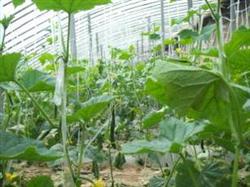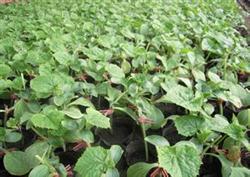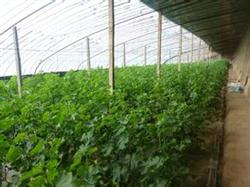Integrated control of cucumber diseases and insect pests in greenhouse in spring

1. Common diseases in spring 1. ⑴ occurrence characteristics of downy mildew: stubborn (long-term concomitant), destructive (fast spread, outbreak). ⑵ occurrence conditions: high humidity: more than 83% relative humidity is conducive to the disease (water droplets or water film on the leaf surface), spore germination and invasion. Suitable temperature: 15 ℃ 20 min. Nutritional status: carbon-nitrogen ratio imbalance in the body, plant senescence. ⑶ integrated prevention and control: ① creates a sterile indoor environment. The main way of fungal transmission is wind, so repair the broken film in time, ventilation and dehumidification time, avoid the windy time-cut off the transmission route. ② creates a sterile campus environment. After the diseased plants, leaves and melons in the greenhouse are cleaned out of the greenhouse, they should be buried immediately. 0.1% potassium permanganate should be used frequently around the stacking site to prevent transmission when the wind blows, maintain the aseptic environment of the park, and achieve "everyone's maintenance, everyone's benefit". In this way, repeated infection, transmission and vicious circle of bacteria can be avoided, and the use of pesticides and labor input can be greatly reduced to achieve the purpose of saving cost and increasing efficiency. ③ regular medication prophylaxis. A, preventive agents: bran vinegar (1:3:3) + Tianda 2116, Cobo, zinc thiazole, Antaisheng, Dakening, 0.1% potassium permanganate, 80% ethyl phosphine aluminum 30g + sugar and vinegar solution + medical streptomycin sulfate 1 million units 3, chlorothalonil aerosol. B, therapeutic agents: remove diseased heavy leaves before administration, eliminate pathogens-artificial sterilization, especially with imported agents before watering. Choice of medicine: ethyl phosphine aluminum manganese zinc, Yikuangjing, DuPont Kru, Baitai, Kate, Kailun, Akwhite, bright shield. ④ physical control: high temperature greenhouse: suitable for growing plants. Advantages: sterilization, downy mildew, gray mold, white powder, etc., good effect, save pesticides, reduce labor. Step: → watering → tuyere → heating up 43 ℃→ 46 ℃→ lasting 1.5 ℃→ for 2 hours → watering the next day. Note: hang 3 thermometers in the middle of the greenhouse, front, middle and rear, shade the south of the thermometer; observe every 15 minutes; put grass curtain to cool down more than 48 ℃, do not pull tuyere to cool down. 2. Botrytis cinerea ⑴ clean up the diseased melon: put the diseased melon into the mouth of the bottle with a cola bottle, and then carefully remove it to prevent the spread of diseased spores. Diseased melons and leaves should be buried or burned outside and disinfected and sterilized in the storage place. Unarmed removal, casually thrown outside, is tantamount to helping the spread of germs, continuous medication, continuous occurrence, difficult to control, more and more serious. ⑵ selected medicament: 65% Kedelin 1000-150025% fungus Siqi EC 1000 times, Ruizhen, Kaiser, Shijiale, Nongliling, chlorpromazine, anti-aldicarb, prednisolone, focusing on spraying young fruit. The disease has been resistant to Prochloraz, so it is recommended to use less. 3. ⑴ prevention of whitefly: the yellow board is hung indoors and the outdoor vents are covered with insect control net. How to use the yellow board: hang about 20 pieces per mu and distribute evenly. The hanging height is above 15-20cm at the top of the plant, and the position of the yellow plate increases with the plant growth. ⑵ treatment: ① night fumigation, Dadusheng, dichlorvos smoke 0.5Kg/ mu, or an appropriate amount of sawdust adsorbed 80% dichlorvos EC 300ml 400ml, put on tiles or flowerpots. ② morning spray, DuPont Wanling + imidacloprid forest, Uranus, Meng Meng, Aktai, avermectins, pyrethroids. Serious coal fouling disease (carbendazim, carbendazim, carbendazim). Second, the correct use of chemicals 1, spray temperature: 18 Mel 28 ℃. When the temperature is higher than 28 ℃, it is easy to cause drug damage, and the control effect is poor if the temperature is too low. 2. Concentration formulation: drug use per barrel (g) = 15000 times / dilution multiple. 3. Use auxiliaries: silicone, penetration, urea and sugar to increase the absorption rate by 50%. 4. The use of aerosol: the effect is the most outstanding in cloudy and snowy days. After fumigation for 5-8 hours, the shed can be opened for ventilation. If the fumigation time is too long, it will cause drug damage. 5. ⑴ cucumber sensitive agents: phoxim, paclobutrazol, triazole copper, avermectin, parathion, ethephon, prednisone; ⑵ control agents: Shigao, Fuxing, mancozeb, carbendazim, control the use of agents. Third, frequent cleaning of greenhouse film-the growth of broad-spectrum germicidal cucumber needs five ecological factors: temperature, light, water, fertilizer and gas, in which temperature and light are directly affected by the transmittance of greenhouse film. In addition, ultraviolet rays in the sun enter the greenhouse to kill pathogens, and plants can be dwarfed to make them strong. The UV lamp developed now makes use of this mechanism. Therefore, it is necessary to often clean and wipe the greenhouse film to achieve the highest light transmittance and give full play to its triple functions: enhance the light intensity, improve the photosynthetic efficiency, improve the air temperature and ground temperature in the greenhouse, and kill a variety of bacteria. In production, attention should be paid to the integrated use and comprehensive use of technologies to reduce the use of pesticides (such as ecological bacteriostasis, shielding, health care, sterilization, manual sterilization), which can not only save cost and increase efficiency, but also improve product quality. in line with the needs of consumers for pollution-free products and the requirements of modern agricultural development.
- Prev

When is it good to plant cucumber in small arch shed in spring and early maturity?
When to plant cucumber in small arch shed in spring? How to make it slow and grow fast? The suitable planting period of cucumber cultivated in plastic film shed was the last ten days of March. Cucumber seedling slow speed after planting, growth is good or bad by many environmental factors, the most important of which is the root growth.
- Next

Management skills of cucumber in shed after Spring Festival
Manage the fertilizer and water well in the middle and late February, most greenhouse cucumbers enter the peak period of melon production, and the demand for fertilizer and water also increases gradually. therefore, cucumber topdressing should be carried out after the end of February. Generally, urea 20 kg, potassium dihydrogen phosphate 5 kg 8 kg or potassium sulfate compound fertilizer 30 kg 35 kg is applied every 15 ha, and 1 every 20 days.
Related
- Where is it suitable to grow horseradish in China? it is expected to see the middle altitude horseradish in Alishan.
- How to prevent tomato virus disease reasonably? (Control methods included)
- Many people like to plant towel gourd on the balcony. What are the main points of this method and management?
- What crops can chili peppers be mixed with?
- Fertilization techniques and matters needing attention in Tomato
- What are the grafting techniques for peach seedlings in spring?
- Harm and control methods of root swelling disease of Chinese cabbage
- What are the pests of sweet potatoes? How to prevent and cure it?
- Symptoms, causes and Control methods of navel Rot in Tomato
- The cause of "Cucumber rotten bibcock" in Farmers' planting Cucumber and its Control Plan

